MTEC, NSTDA, collaborates with Nanjing Forestry University, P.R. China, to “Transfer Bamboo-Based Construction Innovation for Environmental Sustainability and Industrial Advancement in Thailand”

(September 17, 2024), at MTEC Building, the National Science and Technology Development Agency (NSTDA), through the National Metal and Materials Technology Center (MTEC), and Nanjing Forestry University (NJFU), the People’s Republic of China, held a signing ceremony for a Memorandum of Understanding (MOU) on research and development cooperation. This MOU focuses on the “Transfer of Innovative Bamboo-Based Construction Material Technology to Reduce Environmental Impact.” The signing was led by Associate Professor Toemsak Srikhirin, Executive Director of MTEC, and Professor Dr. Zhaoyang Xu, Dean of the College of Materials Science and Engineering, NJFU. The event was honored by the presence of Mr. Ma Minggeng, Counselor (Science and Technology) from the Chinese Embassy in Thailand, Dr. Pasupha Chinvarasopak, Minister-Counselor (Science and Technology) at the Royal Thai Embassy in Beijing, and Dr. Wannipa Koodsela, Assistant Deputy Director / Chinese Coordinator from Program Management Unit on Area Based Development (PMU-A). Also, attendees from both sides were Dr. Thipjak Na Lampang, Research Team Leader, Wood Engineering for Sustainability Research Team (WEST) at MTEC, Associate Professor Dr. Tao Ding, Deputy Director of Human Resources at NJFU, as well as the executive teams and researchers from both organizations. This collaboration aims to enhance sustainable agriculture and boost technological capacity in innovative materials. The primary goal is to transfer technology for using bamboo as an environmentally friendly alternative construction material between Thailand and China, contributing to the advancement of Thailand’s industrial sector.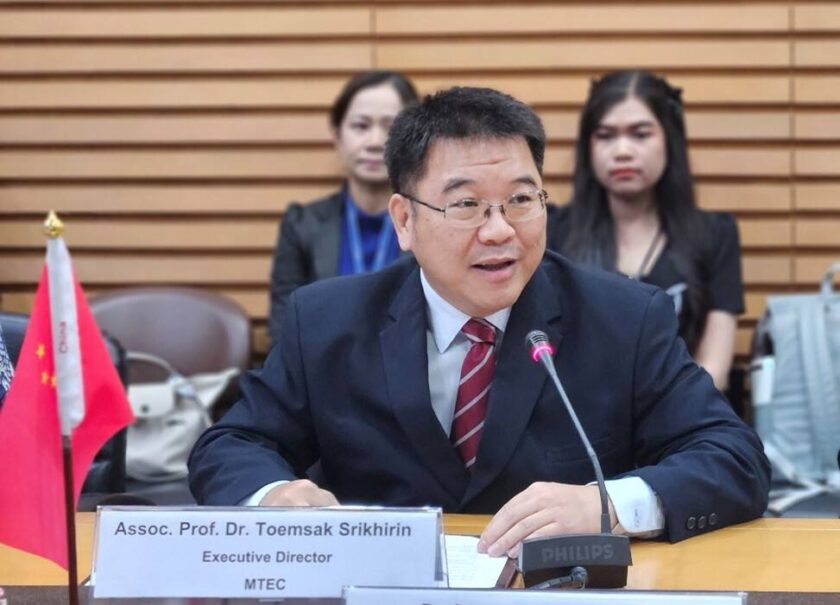
Associate Professor Toemsak Srikhirin stated, “Today’s MOU signing ceremony marks a significant milestone in the tangible cooperation between our two institutions and reflects the shared vision to promote academic and research advancement between the two countries. This collaboration will serve as a mechanism to drive new cooperative projects in the future, leading to the creation of innovations and adding academic value to both institutions for many years to come.
This collaboration would not have been possible without the support of Dr. Pasupha Chinvarasopak, Minister-Counselor (Science and Technology) at the Royal Thai Embassy in Beijing who played a crucial role in connecting and guiding both organizations, leading to this concrete partnership. I would also like to extend my sincere thanks to Mr. Ma Minggeng, Counselor (Science and Technology) and representative from the Chinese Embassy in Thailand, and PMU-A for honoring us with their presence today and serving as witnesses to this event.”

Professor Dr. Zhaoyang Xu remarked, “Today is extraordinary, as it aligns with the Mid-Autumn Festival, a notable celebration in China. This occasion symbolizes the promising outcomes of the collaboration between MTEC and NJFU. Our partnership was initiated following MTEC’s visit to NJFU, where they toured our Bamboo Museum and Bamboo Processing Laboratory. We also conducted an on-site investigation in Zixi County, Jiangxi Province. This visit solidified the foundation of a robust relationship, fostering mutual confidence in knowledge exchange and technological advancements. Moving forward, we will continue to work together on innovations in bamboo processing between China and Thailand. This partnership marks a significant leap in enhancing both our capacities and technological progress, contributing to sustainable development on both national and global scales.”
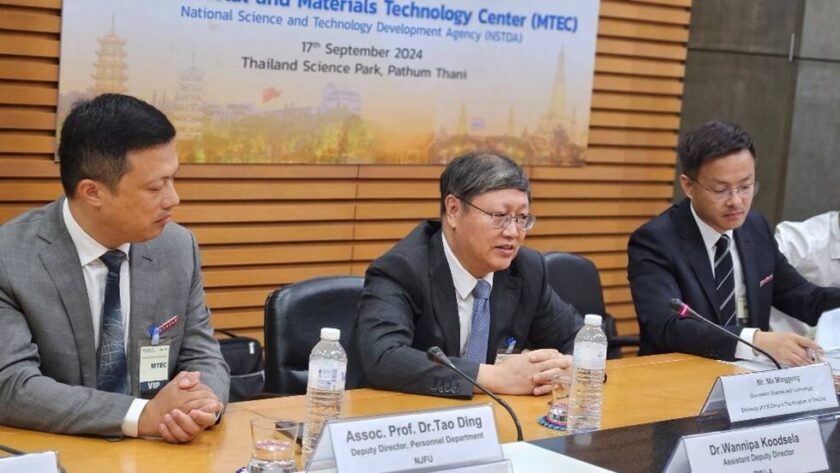
Mr. Ma Minggeng added, “I would like to congratulate MTEC and NJFU on successfully signing the MoU today. This collaboration, focusing on using bamboo as an alternative material for innovation, marks a crucial achievement for both countries as we explore new areas of cooperation. Climate change is a pressing issue that affects not only Thailand but the world at large, including China. With China’s vast and varied landscape, there are countless opportunities for Thailand and China to expand our joint efforts in research and innovation. As reflected in the several successful projects funded by The Mekong- Lancang Special Fund. As a representative of the Chinese Embassy in Thailand, I am proud to express our commitment to fostering deeper cooperation between our two countries, particularly in knowledge, technology, and innovation, to promote sustainable development.”
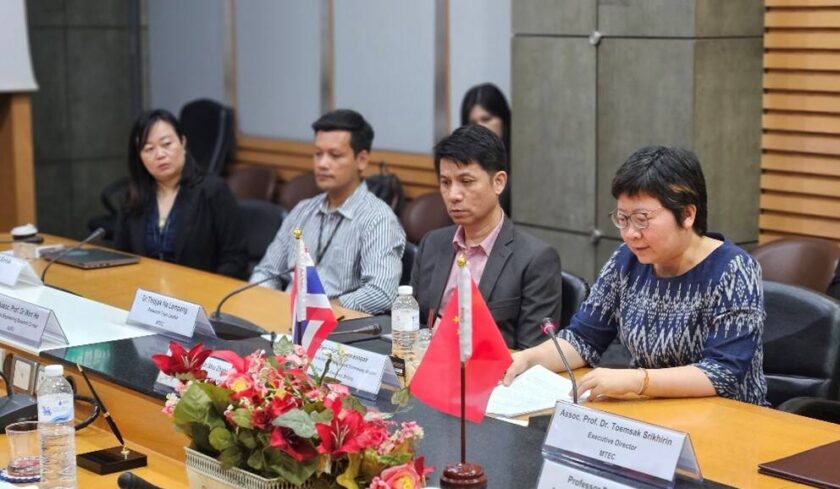
Dr. Pasupha Chinvarasopak expressed her sentiments, “It is a great honor for me to attend the MoU signing ceremony between MTEC and NJFU today. On behalf of the Royal Thai Embassy in Beijing, I congratulate MTEC and the College of Materials Science and Engineering, NJFU, for initiating this collaboration focused on bamboo as an environmentally friendly alternative construction material.
Nowadays, the world is contended with increasingly severe natural disasters, such as the recent flooding in northern Thailand; international partnerships are crucial in tackling these challenges. In my role as Minister-Counselor, responsible for advancing cooperation in science, technology, innovation, research, and education between Thailand and China, I emphasize that a key element of this collaboration is the BCG (Bio-Circular-Green) economy model. This framework is vital for achieving sustainable development by ensuring the efficient use of natural resources while minimizing environmental harm, allowing us to address global economic challenges effectively.
Today, MTEC and NJFU have become strong partners in promoting sustainable agriculture and enhancing technological capabilities in material innovation, particularly using bamboo as an environmentally friendly construction material in Thailand. I am delighted to participate in this event, which marks an essential step in this collaboration, bringing mutual benefits, advancing technological innovations, promoting sustainable development, and creating new opportunities for stakeholders in both countries.”
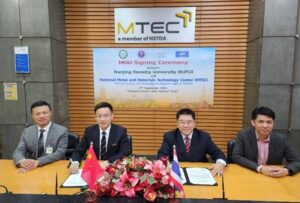 | 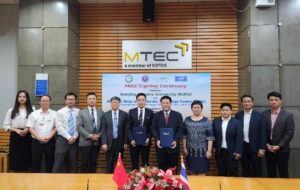 |
Following the MoU signing ceremony, the Executive Director and Deputy Executive Director (Dr. Sitthisuntorn Supothina) from MTEC, led the honorable guests on a tour of MTEC’s laboratories. The visit included the Food Materials Science Laboratory, where the group was welcomed by Dr. Chaiwut Gamonpilas, research team leader under the Advanced Polymer Technology Research Group (APT). Research findings were exchanged, and the team discussed technologies critical to developing food materials science, focusing on sustainable health and food suitable for all ages. The research group is dedicated to utilizing locally produced agricultural products as raw materials, reducing reliance on imports. For instance, chickpeas are used to develop plant-based protein alternatives to meat. After that, they also visited the Smart Manufacturing and Maintenance Technology Research Team, welcomed by Dr. Wanida Pongsaksawad, senior researcher from the Rail and Modern Transports Research Group (RMT). The research team shared their work on artificial intelligence and machine learning technologies, which are applied to predict and assess the impact of climate conditions on the corrosion of steel structures. This team has a longstanding partnership with Chinese experts, involving several collaborative projects funded both domestically and internationally.
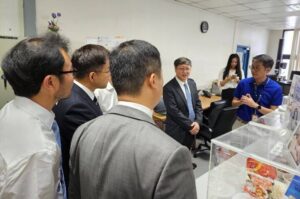 | 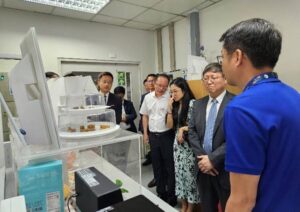 |
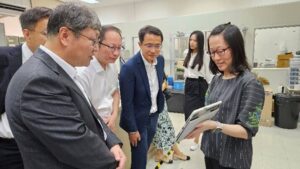 | 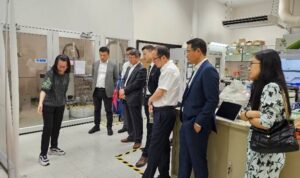 |
